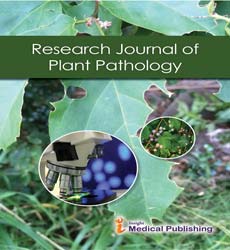FUTURE RENOVATIONS ON PLANT CARE AND DISEASE MANAGEMENT
Abstract
Plant pathology is a science that studies plant diseases and
attempts to improve the chances for survival of plants when
they are faced with unfavorable environmental conditions
and parasitic microorganisms that cause disease. Principles
of diseases management are avoidance, exclusion,
eradication, protection, host resistance and therapy.
Molecular technology increase understanding of the biology
and population structures of plant pathogens provides quick
and accurate answers to epidemiological questions about
plant diseases and support disease management decision.
Procedures and protocols of molecular techniques are
isolation and separation of nucleic Acids. Electrophoresis in
agarose or polyacrylamide gels is the most usual way to
separate DNA molecules according to size. Restriction
mapping involves the size analysis of restriction fragments
produced by several restriction enzymes individually and in
combination. Nucleic acid analysis methods are numerous
methods for analyzing DNA and RNA; however, many of them
are solution based or more recently include the use of chip-
based array systems. Indeed, the lab-on-a-chip approach is
developing rapidly and it is possible to envisage many detection
and analysis methods being developed in this format in the
future. PCR is used to amplify a precise fragment of DNA from
a complex mixture of starting material, usually termed the
template DNA, and in many cases requires little DNA
purification. Molecular biology tools are new being used to
facilitate the conventional disease resistance breeding program
and to shorten the duration to develop a resistant cultivar in
different crops used in plant disease management.
Open Access Journals
- Aquaculture & Veterinary Science
- Chemistry & Chemical Sciences
- Clinical Sciences
- Engineering
- General Science
- Genetics & Molecular Biology
- Health Care & Nursing
- Immunology & Microbiology
- Materials Science
- Mathematics & Physics
- Medical Sciences
- Neurology & Psychiatry
- Oncology & Cancer Science
- Pharmaceutical Sciences
